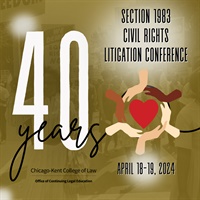Section 1983 Remedies: Damages and Prospective Relief
- Categories:
- Constitutional Law | Civil Rights
- Speaker:
- Noah Smith-Drelich
- Duration:
- 1 Hour 15 Minutes
- Format:
- Audio and Video
- Original Program Date:
- Apr 19, 2024
- Product Type:
- On Demand
- License:
- Access for 365 day(s) after purchase.
Description
- Issues in recently decided Supreme Court attorney’s fees cases (changes in law regarding nominal damages and impact on availability of fees; standards controlling awards to prevailing defendants; fees for modest injunctive relief without money damages; how reasonable fee is determined (lodestar)
- Ethics issues in §1983 cases (including Rule 68 issues, conflicts of interest, frivolous claims)
Ethics Learning Objectives:
1) Duty of lawyer to represent unpopular clients and causes, even for little or no fee
2) Duty of lawyer to put client’s interest in seeking largest recovery above risk to attorney of reduction of court-awarded fees if merits result obtained is substantially less than outcome sought
3) The importance of a detailed written fee agreement in order to minimize ethics dilemmas in representing clients in civil rights cases
Speaker

Noah Smith-Drelich Related Seminars and Products
Assistant Professor of Law
Chicago Kent College of Law
Noah Smith-Drelich is an assistant professor of law at the Chicago-Kent College of Law. His scholarship seeks to better understand the incentive structures underlying tort law, with a current focus on constitutional torts. Smith-Drelich also writes on the constitutional right to travel. His articles have been published or are forthcoming in the Ohio State Law Journal, Florida Tax Review, Southern California Law Review (twice), Indiana Law Journal, Public Health Nutrition, and Loyola of Los Angeles Law Review, as well as the California Law Review Online and Texas Law Review Online.
In addition to his academic research, Smith-Drelich maintains an active pro bono practice in civil rights and civil liberties impact litigation with a focus on indigenous rights and environmental justice. Currently, Smith-Drelich is the originating attorney and lead counsel on Thunderhawk v. County of Morton, a putative class action lawsuit challenging police abuses related to the Standing Rock-led resistance to the Dakota Access Pipeline. The case is in discovery against two defendants. The remaining defendants filed an interlocutory appeal of the district court's denial of their motions to dismiss, which Smith-Drelich argued in the Eighth Circuit Court of Appeals in February 2022.
Before joining the legal academy, Smith-Drelich worked as a staff attorney for the American Civil Liberties Union’s North Dakota, South Dakota, and Wyoming affiliate, and as an attorney at the litigation boutique Korein Tillery. He is a graduate of Stanford Law School, where he was an articles editor on the Stanford Law Review and the editor-in-chief of the Stanford Law & Policy Review.


